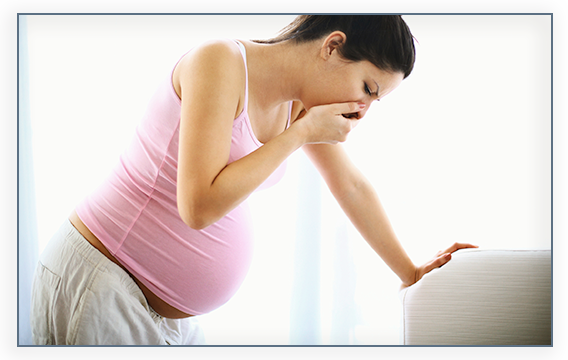Common Pregnancy Symptoms
Throughout pregnancy, your body is going through many physical and hormonal changes which can cause different symptoms. Nausea, vomiting, heartburn, and constipation are several symptoms you may experience over the next 9 months.

Nausea and vomiting
Often called morning sickness, nausea and vomiting may occur in the early months of pregnancy. It is a result of your body adjusting to the higher levels of pregnancy hormones. If you experience discomfort, below are some remedies you can try. Before getting out of bed in the morning:
• Eat a few low-fat crackers or a piece of dry toast. Put them by your bed the night before for easy access.
• Try to stay in bed for about 30 minutes after waking up.
• Get up slowly to avoid sudden movements.
• Eat 5 or 6 small meals a day; avoid going for long periods without food.
• When feeling nauseous, drink small amounts of ginger ale, clear soup, or apple juice.
• Avoid fried and greasy foods.
• If the smell of cooking certain foods make you nauseous, open a window or use a fan. If someone else is cooking, avoid the kitchen until the meal is served.
• Eat foods that are easy on your stomach (skinless chicken, noodles, baked potatoes, applesauce, and gelatin).
Have more questions? Listen to our FREE podcast!
LISTEN NOWConstipation
Pregnancy hormones can also slow down movement within your intestinal system. To prevent this:
• Try to eat meals at the same time each day.
• Slowly increase the amount of fiber you’re eating by adding 1 or 2 new fiber-rich foods to your diet each week. Too much fiber at one time can cause bloating and gas pain.
• Eat more raw fruits and vegetables, including the skins.
• Be sure to get at least 2.3L (about 80 oz.) of water each day.
• Incorporate exercise into your daily routine. Physical activity can help digest food.
Heartburn
Heartburn can be a problem in the last several months of pregnancy. As your baby grows, there is more pressure on the stomach resulting in stomach acids being pushed upwards. Try the following tips to ease heartburn toward the end of your pregnancy:
• Eat several small, nourishing meals instead of three big ones. This may prevent extra pressure.
• Limit fried and fatty foods.
• Try lower fat or skim milk.
• Avoid foods that cause gas; sit upright for at least an hour after a meal.
• Walk for 10 minutes after meals – especially your evening meal.
The information contained here within is not intended to be a substitute for professional medical advice, diagnosis, or treatment. Always seek the advice of your physician or other qualified health provider with any questions you may have regarding a medical condition. Never disregard professional medical advice or delay in seeking it because of something you have read. If you think you may have a medical emergency, call your doctor, go to the emergency department, or call 911 immediately. Edwards Health Care Services (EHCS) does not recommend or endorse any specific tests, physicians, products, procedures, opinions, or other information that may be mentioned here within. Reliance on any information provided by EHCS, EHCS employees, contracted writers, or medical professionals presenting content for publication here within is solely at your own risk.
Sources:
• https://www.cdc.gov/reproductivehealth/maternalinfanthealth/pregnancy-weight-gain.htm
• https://americanpregnancy.org/pregnancy-health/pregnancy-weight-gain/
• https://www.nhlbi.nih.gov/health/educational/lose_wt/BMI/bmicalc.htm
Tags: Constipation, Health, Heartburn, Morning Sickness, Pregnancy, Symptoms, Tips, Wellness

